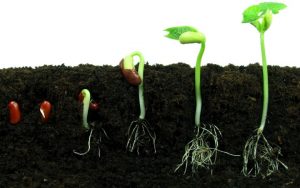I’m sure you’ve heard it said there are three things that are best left out conversation at of family gatherings. You know them: Religion, sex, and politics. But, unless your family has taken an oath of silence, we do talk about those things. We just do it really badly. I think there may be one more topic we do not talk about. Death. Yes, we acknowledge death when it happens but for the most part we do not talk about death with any real depth or substance, and certainly not with any enthusiasm. Most people try to deny it, ignore it or just avoid it.
The death of our loved ones is too real, too painful. Our own death is too scary. The relationships and parts of our lives that have died are too difficult. So, for the most part, we just avoid the topic of death. Besides it’s a downer in a culture that mostly wants to be happy, feel good, and avoid difficult realities.
 In today’s reading Jesus brings up the topic of death in an indirect way. You can almost see Jesus words when He says “I am troubled now.” They are so visually clear. He told his listeners: “If a seed is planted into the ground and it does not die, it remains a seed. But if it dies, it produces many seeds and seedlings and those seeds and their seedlings produce much fruit.”
In today’s reading Jesus brings up the topic of death in an indirect way. You can almost see Jesus words when He says “I am troubled now.” They are so visually clear. He told his listeners: “If a seed is planted into the ground and it does not die, it remains a seed. But if it dies, it produces many seeds and seedlings and those seeds and their seedlings produce much fruit.”
It all begins with the seed dying. So, could it be that the key to life is death? Could it be that the key to living is dying? Could it be that dying is important to living? Think what happens when seeds are planted into the ground.
I came “this close” to being a biology major because in my early days in community someone thought it would be good if we had a member who could teach upper grades science. [But I was saved by an educational career specialist who recognized that my talents – and bent – lay in another field and direction.]
If you’ve ever taught children in the lower grades, or you may remember yourself, putting a lima bean in a wet paper towel against the inside of a glass so you could see what would happen. Recall how we put one of the containers with beans on a window sill and the other in a dark cabinet? Then we noted our “observations” – our big new scientific word. We witnessed what the teacher told us to be true. Inside every seed is an embryo and every embryo has a root and a shoot; and inside that little embryo, (and this is the real a miracle), there is an “on” and “off” switch. REALLY! Every seed has a “on” and “off” switch; they really do!
There is also a thin coat around that seed which protects it from oxygen getting in prematurely. When the dormant seed is planted into the ground, and allowed to mature naturally, at the right time, the switch goes “ON” and the seed takes in water, and it miraculously begins to expand – the seed coat breaks and the seed begins to mature and produce sugar and protein. And then down goes the little roots and up grow the little shoots, and the shoots produce more seeds which produce more fruit. And, that’s when the seed dies!
Jesus said this! “Unless a seed dies, it remains a single seed; but if it dies, it produces many seeds and much fruit.” This is the law of life that Jesus teaches us today. It is in dying that we live. In fact it is only by first dying that we will ever begin living.
When the cycle of nature is disrupted … when death does not produce new life, it is remains just a single seed … It might survive a while – but it never produces fruit. If we refuse to die to self, we might survive, but we aren’t rally alive in the Spirit. Resurrection is always hidden within death. However, without death there can be no resurrection.
Lent is a good time to practices “little deaths” to self: giving up a self-serving idea, in good spirit changing an opinion, letting go of an ambition, so that God might coax us (like the seedling) to follow the light in order stand erect and put down roots in the spirit of Benedict deep into community life.
And when it is our time, when the water of God’s grace and the light of God’s love can penetrate our thick shells we will know, and be enabled to divest ourselves in favor of new life. May we graciously lay down whatever the habit we have developed, or the challenge we’ve been stepping around for so long. (In the image of the plant), allow those things to become fertilizer for the next seedlings God plants in our hearts.
Francis of Assisi knew all this well when he wrote in his famous Prayer for Peace; “It is in giving that we receive; it is in dying that we are born to eternal life.”
~Reflection by Sister Roberta Bailey, OSB, Prioress


Leave a Reply